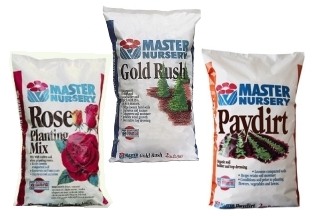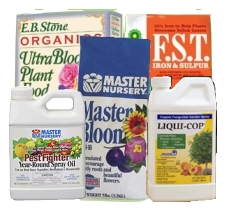February Garden Calendar
What Should I Do?
This is a good month to plant Sweet Peas if you want to enjoy fragrant bouquets of sweet pea flowers in the late spring. Also, toward the end of February you can cut back perennials and grasses that have gone dormant.
Cold weather can still be a concern for frost sensitive plants so stay alert. A few warm days in February can make us think that Spring has arrived, but we usually have some cold nights through the end of the month and into early March.
Preventive Weed Control
Controlling weeds in the Spring can be a headache. You can help eliminate many of the unwanted weeds in your yard and lawn by appling a Pre-emergent weed control such as Bonide Crabrass & Weed Preventer or Concern Weed Prevention Plus. These products help keep many weed seeds from germinating. You should apply in early February for best control. It doesn't kill existing weeds. It only prevents new ones from growing. It can be used around shrubs, trees, and flowers. It is not for use around vegetables.
Prepare Your Vegetable Beds For Spring Planting

This is the month to start getting your garden area prepared for the spring and summer vegetables if your beds are not full of winter vegetables. If you are still growing winter vegetables, then you'll wait to do any soil preparation until later. Add Gold Rush(a high quality fir mulch with chicken manure), Pay Dirt or your own compost to your garden areas. We recommend mixing one bag of the Gold Rush and one bag of the PayDirt into a 50 to 100 square foot area depending on the condition of your soil. Work into the soil at least 6 inches. Remember the better your soil, the better chance of having good vegetables. The Master Nursery Rose Mix is also a great alternative because of its high nutrient content. Many use this for their raised beds and container vegetable gardens. If you want to get a headstart on your vegetables, then February is the time to start vegetable seeds indoors. If you don't want to worry about the weather, then wait until late March to plant vegetables. For those very enthusiastic gardeners, tomato plants are usually available as early as the end of February. If you plant the tomatoes that early, they will need to either be covered with a frost cloth or other protective material or grown inside or in a greenhouse.
Rose Care
Spray your roses with Liqui-Cop and Horticultural Oil to protect your roses from diseases caused by fungus and to kill unwanted pests that may be wintering over on your roses. We recommend spraying the canes as well as the soil around the roses.
You can feed your roses one more time
with 0-10-10 (Master Bloom). We also recommend using Magnesium Sulfate, more
commonly known as Epsom Salts, during this month to help increase the size of
your flowers in the spring. Many people will also use a little bit of Alfalfa
Meal during this month as well.
For more information about roses, go to our Rose
Care Page.

Fruit Trees
It's time to fertilize your fruit trees one last time with 0-10-10 (Master Bloom) and F.S.T.(an iron, sulfur, maganese, and zinc supplement) to help ensure a better fruit crop this year and to strengthen your trees.
Also spray your dormant fruit trees with Liqui-Cop and Master Nursery Horticultural Oil in the beginning of February and again as the buds begin to break open(flowers are not yet open but the buds are beginning to show a little color) to kill off any unwanted fungus and any insects that may be wintering over. These products can be sprayed together at the same time. It's best to spray when there will be a day of no rain.
Watch out for Pests in your garden
Watch out for these unwanted guests - SNAILS, SLUGS, EARWIGS, and SOWBUGS! As Spring emerges, so will they in full force. Be sure to apply a multipurpose snail and crawling insect killer like Sluggo Plus or Diatomaceous Earth around your garden areas in mid to late February, especially around newly planted flowers, vegetables, and perennials. If you plant your garden and take no preventive measure to control these unwanted pests, your garden experience may be less than you expect.
What's Coming Soon
This is the month when a lot of our gift items arrive in the store. We'll have great items for the garden and your home. Also new shipments of pottery begin to arrive as well. We'll receive pottery shipments throughout the Spring and Summer.
Summer vegetables will start to arrive in early March. Tomatoes are usually first, followed by peppers, squash, cucumbers, eggplant and more.